Achintha Wijesinghe
University of California at Davis, USA
TACO: Rethinking Semantic Communications with Task Adaptation and Context Embedding
May 16, 2025



Abstract:Recent advancements in generative artificial intelligence have introduced groundbreaking approaches to innovating next-generation semantic communication, which prioritizes conveying the meaning of a message rather than merely transmitting raw data. A fundamental challenge in semantic communication lies in accurately identifying and extracting the most critical semantic information while adapting to downstream tasks without degrading performance, particularly when the objective at the receiver may evolve over time. To enable flexible adaptation to multiple tasks at the receiver, this work introduces a novel semantic communication framework, which is capable of jointly capturing task-specific information to enhance downstream task performance and contextual information. Through rigorous experiments on popular image datasets and computer vision tasks, our framework shows promising improvement compared to existing work, including superior performance in downstream tasks, better generalizability, ultra-high bandwidth efficiency, and low reconstruction latency.
Task-Adaptive Semantic Communications with Controllable Diffusion-based Data Regeneration
May 12, 2025Abstract:Semantic communications represent a new paradigm of next-generation networking that shifts bit-wise data delivery to conveying the semantic meanings for bandwidth efficiency. To effectively accommodate various potential downstream tasks at the receiver side, one should adaptively convey the most critical semantic information. This work presents a novel task-adaptive semantic communication framework based on diffusion models that is capable of dynamically adjusting the semantic message delivery according to various downstream tasks. Specifically, we initialize the transmission of a deep-compressed general semantic representation from the transmitter to enable diffusion-based coarse data reconstruction at the receiver. The receiver identifies the task-specific demands and generates textual prompts as feedback. Integrated with the attention mechanism, the transmitter updates the semantic transmission with more details to better align with the objectives of the intended receivers. Our test results demonstrate the efficacy of the proposed method in adaptively preserving critical task-relevant information for semantic communications while preserving high compression efficiency.
Task-Driven Semantic Quantization and Imitation Learning for Goal-Oriented Communications
Feb 25, 2025



Abstract:Semantic communication marks a new paradigm shift from bit-wise data transmission to semantic information delivery for the purpose of bandwidth reduction. To more effectively carry out specialized downstream tasks at the receiver end, it is crucial to define the most critical semantic message in the data based on the task or goal-oriented features. In this work, we propose a novel goal-oriented communication (GO-COM) framework, namely Goal-Oriented Semantic Variational Autoencoder (GOS-VAE), by focusing on the extraction of the semantics vital to the downstream tasks. Specifically, we adopt a Vector Quantized Variational Autoencoder (VQ-VAE) to compress media data at the transmitter side. Instead of targeting the pixel-wise image data reconstruction, we measure the quality-of-service at the receiver end based on a pre-defined task-incentivized model. Moreover, to capture the relevant semantic features in the data reconstruction, imitation learning is adopted to measure the data regeneration quality in terms of goal-oriented semantics. Our experimental results demonstrate the power of imitation learning in characterizing goal-oriented semantics and bandwidth efficiency of our proposed GOS-VAE.
Efficient Transmission of Radiomaps via Physics-Enhanced Semantic Communications
Jan 18, 2025



Abstract:Enriching information of spectrum coverage, radiomap plays an important role in many wireless communication applications, such as resource allocation and network optimization. To enable real-time, distributed spectrum management, particularly in the scenarios with unstable and dynamic environments, the efficient transmission of spectrum coverage information for radiomaps from edge devices to the central server emerges as a critical problem. In this work, we propose an innovative physics-enhanced semantic communication framework tailored for efficient radiomap transmission based on generative learning models. Specifically, instead of bit-wise message passing, we only transmit the key "semantics" in radiomaps characterized by the radio propagation behavior and surrounding environments, where semantic compression schemes are utilized to reduce the communication overhead. Incorporating the novel concepts of Radio Depth Maps, the radiomaps are reconstructed from the delivered semantic information backboned on the conditional generative adversarial networks. Our framework is further extended to facilitate its implementation in the scenarios of multi-user edge computing, by integrating with federated learning for collaborative model training while preserving the data privacy. Experimental results show that our approach achieves high accuracy in radio coverage information recovery at ultra-high bandwidth efficiency, which has great potentials in many wireless-generated data transmission applications.
LaMI-GO: Latent Mixture Integration for Goal-Oriented Communications Achieving High Spectrum Efficiency
Dec 18, 2024



Abstract:The recent rise of semantic-style communications includes the development of goal-oriented communications (GOCOMs) remarkably efficient multimedia information transmissions. The concept of GO-COMS leverages advanced artificial intelligence (AI) tools to address the rising demand for bandwidth efficiency in applications, such as edge computing and Internet-of-Things (IoT). Unlike traditional communication systems focusing on source data accuracy, GO-COMs provide intelligent message delivery catering to the special needs critical to accomplishing downstream tasks at the receiver. In this work, we present a novel GO-COM framework, namely LaMI-GO that utilizes emerging generative AI for better quality-of-service (QoS) with ultra-high communication efficiency. Specifically, we design our LaMI-GO system backbone based on a latent diffusion model followed by a vector-quantized generative adversarial network (VQGAN) for efficient latent embedding and information representation. The system trains a common feature codebook the receiver side. Our experimental results demonstrate substantial improvement in perceptual quality, accuracy of downstream tasks, and bandwidth consumption over the state-of-the-art GOCOM systems and establish the power of our proposed LaMI-GO communication framework.
Diff-GO$^\text{n}$: Enhancing Diffusion Models for Goal-Oriented Communications
Dec 09, 2024
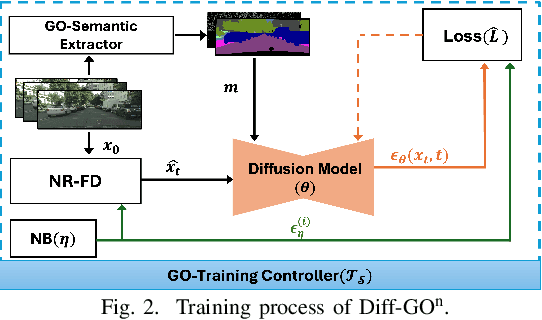
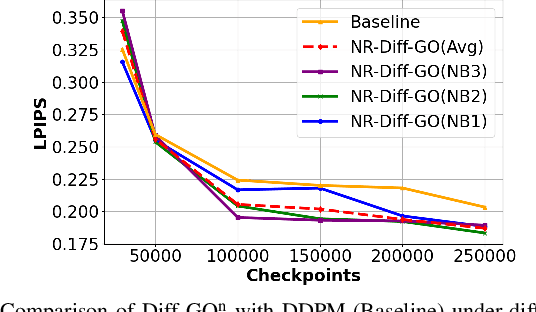

Abstract:The rapid expansion of edge devices and Internet-of-Things (IoT) continues to heighten the demand for data transport under limited spectrum resources. The goal-oriented communications (GO-COM), unlike traditional communication systems designed for bit-level accuracy, prioritizes more critical information for specific application goals at the receiver. To improve the efficiency of generative learning models for GO-COM, this work introduces a novel noise-restricted diffusion-based GO-COM (Diff-GO$^\text{n}$) framework for reducing bandwidth overhead while preserving the media quality at the receiver. Specifically, we propose an innovative Noise-Restricted Forward Diffusion (NR-FD) framework to accelerate model training and reduce the computation burden for diffusion-based GO-COMs by leveraging a pre-sampled pseudo-random noise bank (NB). Moreover, we design an early stopping criterion for improving computational efficiency and convergence speed, allowing high-quality generation in fewer training steps. Our experimental results demonstrate superior perceptual quality of data transmission at a reduced bandwidth usage and lower computation, making Diff-GO$^\text{n}$ well-suited for real-time communications and downstream applications.
TiRE-GAN: Task-Incentivized Generative Learning Models for Radiomap Estimation with Radio Propagation Model
May 04, 2024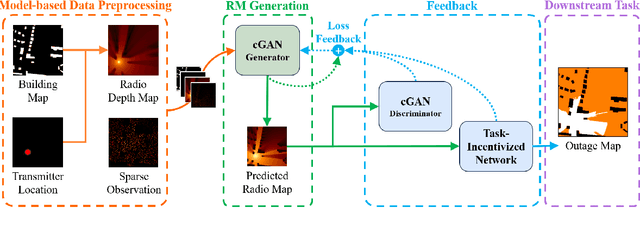
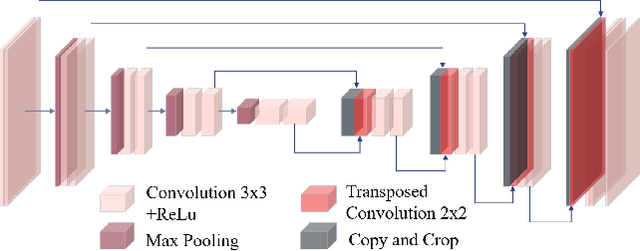
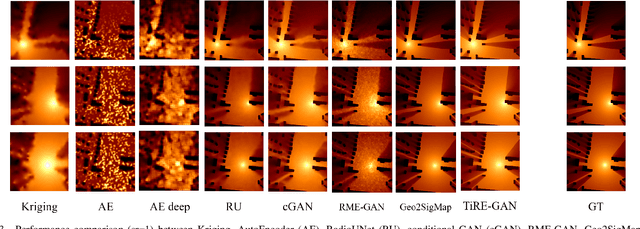
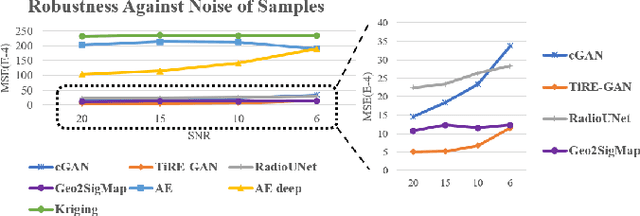
Abstract:Enriching geometric information on radio frequency (RF) signal power distribution in wireless communication systems, the radiomap has become an essential tool for resource allocation and network management. Usually, a dense radiomap is reconstructed from sparse observations collected by deployed sensors or mobile devices, which makes the radiomap estimation an urgent challenge. To leverage both physical principles of radio propagation models and data statistics from sparse observations, this work introduces a novel task-incentivized generative learning model, namely TiRE-GAN, for radiomap estimation. Specifically, we first introduce a radio depth map as input to capture the overall pattern of radio propagation and shadowing effects, following which a task-driven incentive network is proposed to provide feedback for radiomap compensation depending on downstream tasks. Our experimental results demonstrate the power of the radio depth map to capture radio propagation information, together with the efficiency of the proposed TiRE-GAN for radiomap estimation.
A Principled Hierarchical Deep Learning Approach to Joint Image Compression and Classification
Oct 30, 2023



Abstract:Among applications of deep learning (DL) involving low cost sensors, remote image classification involves a physical channel that separates edge sensors and cloud classifiers. Traditional DL models must be divided between an encoder for the sensor and the decoder + classifier at the edge server. An important challenge is to effectively train such distributed models when the connecting channels have limited rate/capacity. Our goal is to optimize DL models such that the encoder latent requires low channel bandwidth while still delivers feature information for high classification accuracy. This work proposes a three-step joint learning strategy to guide encoders to extract features that are compact, discriminative, and amenable to common augmentations/transformations. We optimize latent dimension through an initial screening phase before end-to-end (E2E) training. To obtain an adjustable bit rate via a single pre-deployed encoder, we apply entropy-based quantization and/or manual truncation on the latent representations. Tests show that our proposed method achieves accuracy improvement of up to 1.5% on CIFAR-10 and 3% on CIFAR-100 over conventional E2E cross-entropy training.
PFL-GAN: When Client Heterogeneity Meets Generative Models in Personalized Federated Learning
Aug 23, 2023Abstract:Recent advances of generative learning models are accompanied by the growing interest in federated learning (FL) based on generative adversarial network (GAN) models. In the context of FL, GAN can capture the underlying client data structure, and regenerate samples resembling the original data distribution without compromising the private raw data. Although most existing GAN-based FL works focus on training a global model, Personalized FL (PFL) sometimes can be more effective in view of client data heterogeneity in terms of distinct data sample distributions, feature spaces, and labels. To cope with client heterogeneity in GAN-based FL, we propose a novel GAN sharing and aggregation strategy for PFL. The proposed PFL-GAN addresses the client heterogeneity in different scenarios. More specially, we first learn the similarity among clients and then develop an weighted collaborative data aggregation. The empirical results through the rigorous experimentation on several well-known datasets demonstrate the effectiveness of PFL-GAN.
UFed-GAN: A Secure Federated Learning Framework with Constrained Computation and Unlabeled Data
Aug 10, 2023Abstract:To satisfy the broad applications and insatiable hunger for deploying low latency multimedia data classification and data privacy in a cloud-based setting, federated learning (FL) has emerged as an important learning paradigm. For the practical cases involving limited computational power and only unlabeled data in many wireless communications applications, this work investigates FL paradigm in a resource-constrained and label-missing environment. Specifically, we propose a novel framework of UFed-GAN: Unsupervised Federated Generative Adversarial Network, which can capture user-side data distribution without local classification training. We also analyze the convergence and privacy of the proposed UFed-GAN. Our experimental results demonstrate the strong potential of UFed-GAN in addressing limited computational resources and unlabeled data while preserving privacy.
 Add to Chrome
Add to Chrome Add to Firefox
Add to Firefox Add to Edge
Add to Edge